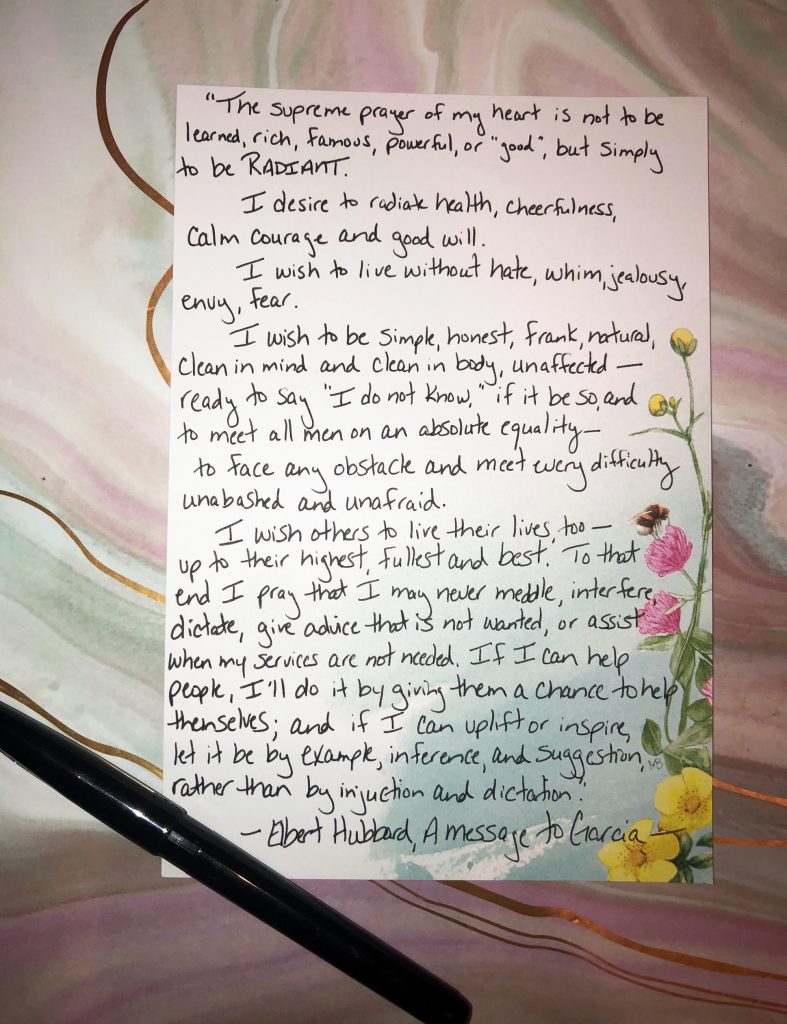Elbert Hubbard had the right idea.
Hubbard (1856-1915) was an American writer and publisher who drew inspiration from William Morris, Pre-Raphaelite associate and key figure of the Arts and Crafts movement.
There’s a lot to explore in Hubbard’s works that I hope will inspire future posts. But for now, let’s focus on a passage of his that I admire and aspire to:
“The supreme prayer of my heart is not to be learned, rich, famous, powerful, or “good,” but simply to be radiant. I desire to radiate health, cheerfulness, calm courage and good will. I wish to live without hate, whim, jealousy, envy, fear. I wish to be simple, honest, frank, natural, clean in mind and clean in body, unaffected—ready to say “I do not know,” if it be so, and to meet all men on an absolute equality—to face any obstacle and meet every difficulty unabashed and unafraid. I wish others to live their lives, too—up to their highest, fullest and best. To that end I pray that I may never meddle, interfere, dictate, give advice that is not wanted, or assist when my services are not needed. If I can help people, I’ll do it by giving them a chance to help themselves; and if I can uplift or inspire, let it be by example, inference, and suggestion, rather than by injunction and dictation.” (Elbert Hubbard, A Message to Garcia)
What a simple wish, to live without hate and to radiate goodness. I’ve mulled over this quotation countless times, because I find it profound and inspiring.
But how does one be radiant?
I think cultivating my mindset and choosing to be present and purposeful with people is the first step.
For years I’ve worked in customer service, which has offered me ample opportunity to test that theory.
On those times when I’ve entered an interaction with an unhappy customer without preparing my mindset first, I’ve found that my energy inadvertently declines to the level of the disgruntled customer’s wavelength.
There’s no express invitation, no exact moment when I willingly choose to fall into their negative energy. Yet, without mental boundaries and preparation, it’s bound to happen.
So I changed my approach.
I made a conscious choice to focus on compassion every time I began an interaction with an angry customer. I vowed to do my best for them. When they escalated their emotion, I mentally repeated to myself that this person was doing their best.
(They probably weren’t doing their best. But, then again, maybe they were.)
Either way, choosing to believe they were doing their very best led me to intuitively imbue our encounter with compassion.
And, just like that, my interactions turned around.
Of course, I still deal with angry customers, but I’ve also found that the vast majority end up giving me a genuine thank-you or come into the store later to apologize for their attitude on a previous visit.
With just a few seconds to choose my mindset before each encounter, and the willingness to stick with that mindset, I radiate patience and kindness.
That’s something.
I soon wondered if my theory would work in other circumstances. I decided to test the idea in a more intensely personal situation: social anxiety.
Outside of work, occasionally one-on-one interactions with a person I don’t know well are veritable breeding grounds for anxiety.
In those moments, I determined to remove my ego from the situation and focus on projecting kindness toward the person I am talking with. “I wonder what they need from me right now?,” I thought.
Focus on love.
Focus on compassion.
I discovered that ego effortlessly recedes and the authentic self shines through in those moments.
Radiance, I now believe, is the result of our mindset.
I want to be radiant. I desire to radiate health, cheerfulness, calm courage and good will. I wish to live without hate, whim, jealousy, envy, fear. I wish to be simple, honest, frank, natural, clean in mind and clean in body, unaffected—ready to say “I do not know,” if it be so, and to meet all men on an absolute equality—to face any obstacle and meet every difficulty unabashed and unafraid. I wish others to live their lives, too—up to their highest, fullest and best. To that end I pray that I may never meddle, interfere, dictate, give advice that is not wanted, or assist when my services are not needed. If I can help people, I’ll do it by giving them a chance to help themselves; and if I can uplift or inspire, let it be by example, inference, and suggestion, rather than by injunction and dictation.
Thank you, Elbert Hubbard.


